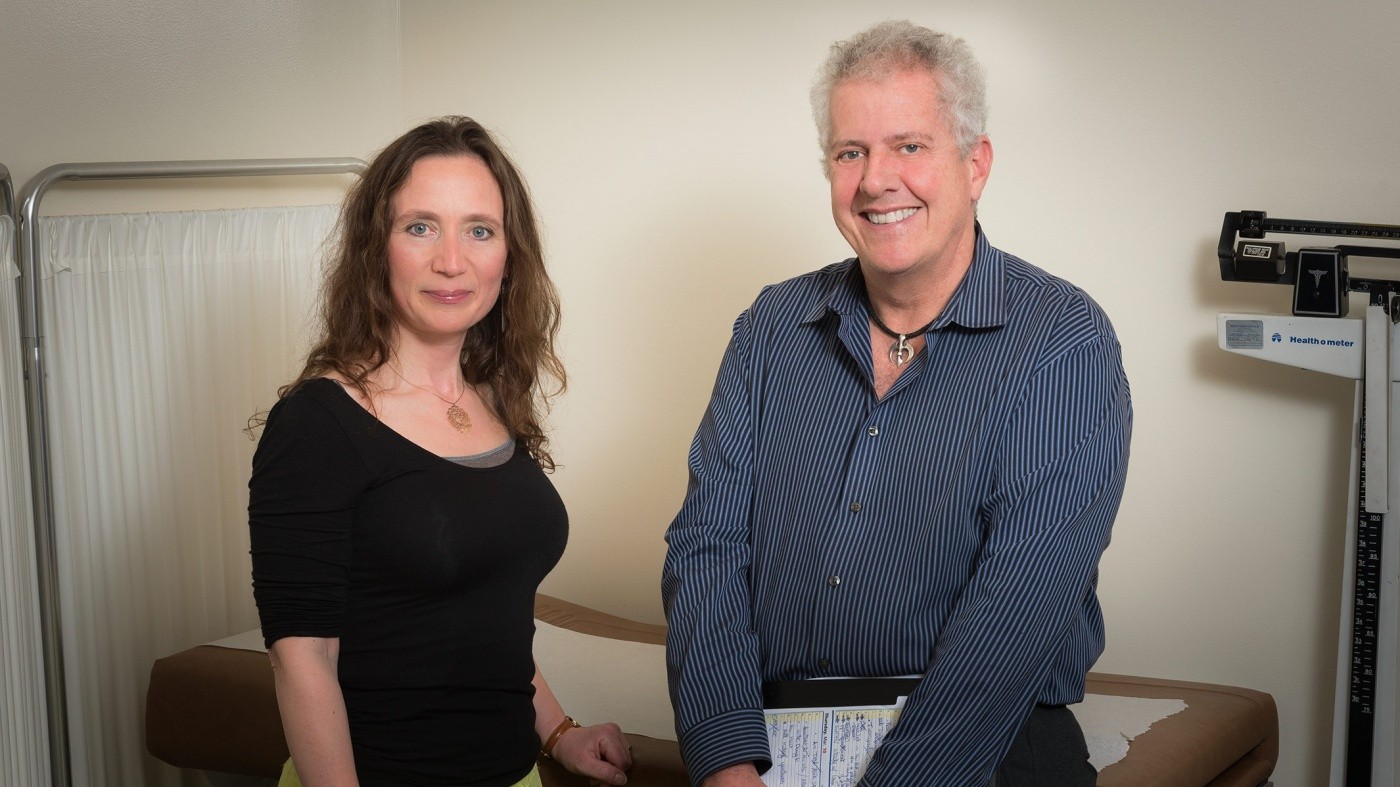Gladstone NOW: The Campaign Join Us on the Journey✕

PrEP has reduced HIV infections nationwide, and researchers Patricia Defechereux, PhD, and Bob Grant, MD, MPH, hope that a long-acting injectable form will help expand protection. [Photo: Chris Goodfellow, Gladstone Institutes]
A daily pill to prevent HIV has revitalized the fight against the deadly virus. Oral pre-exposure prophylaxis, or PrEP, has prevented thousands of men and women from contracting HIV and inspired nationwide campaigns to “Get to Zero.” Now, researchers at the Gladstone Institutes, ViiV Healthcare, and elsewhere are advancing the opportunity to offer PrEP as a long-acting injection, providing people with an easier way to protect themselves against HIV.
Oral PrEP can be thought of like the birth control pill—if taken daily, it dramatically reduces the risk of contracting HIV. However, similarly, if people stop taking the pills, such as from an interruption to their daily routine, protection is reduced. Therefore, scientists have developed a long-acting, injectable form of PrEP to increase the likelihood that people adhere to taking the medication.
An early clinical trial for injectable PrEP found that the new drug and mode of delivery are both safe and feasible. Dubbed the ÉCLAIR study, the trial was conducted in HIV-negative men for 18 months at 10 different sites around the country, including Gladstone. Results from the study were recently presented at the Conference on Retroviruses and Opportunistic Infections (CROI) in Boston.
Early Success with PrEP
Robert Grant, MD, MPH, a senior investigator at Gladstone, was the lead scientist for the ÉCLAIR study at Gladstone—the first phase IIa clinical trial to take place at the Institutes—and a co-author on the CROI presentation. Grant also spearheaded the initial study that tested the use of PrEP to protect people who are at a higher risk of contracting HIV, called the Pre-exposure Prophylaxis Initiative Trial or iPrEx.
Completed in 2010, iPrEx was deemed an enormous success. The study used a cocktail of two antiretroviral drugs, tenofovir disoproxil and emtricitabine, to prevent the spread of HIV. These drugs are now combined into one pill under the brand name Truvada, which is prescribed for PrEP to approximately 25,000 individuals in the United States alone. Working closely with Grant, the Centers for Disease Control and Prevention and the World Health Organization both recommend Truvada for people who are at a higher risk of contracting the virus.
“PrEP is highly effective when used daily, reducing the risk of HIV infection by about 99%. However, some people find it difficult to take a pill every day,” said Grant, who is also a professor of medicine at the University of California, San Francisco. “We hope that a long-acting injectable form of PrEP will expand the number of people who are protected against HIV.”
The Next Generation of HIV Prevention
Building on Grant’s original research, the ÉCLAIR study used the new drug cabotegravir, which stops HIV infection at a different point in the virus’s lifecycle than Truvada. In the CROI presentation, Grant and his colleagues reported that injections of cabotegravir were well-tolerated in study participants, with their most common complaint being mild to moderate pain at the injection site. Notably, none of the study participants contracted HIV while they were on the drug, and the overwhelming majority said they would opt to continue receiving the injection after the study ended.
The next step will be to conduct a phase III clinical trial that confirms the effectiveness of cabotegravir at protecting against HIV.
The Importance of the Human Connection
At Gladstone, Patricia Defechereux, PhD, a senior research associate working with Grant, coordinated the study and met with the participants at Gladstone.
“The men who participated in this study were highly dedicated and motivated to change the course of the HIV epidemic,” said Defechereux. “Remarkably, no one dropped out of the study or missed visits, which is a testament to the commitment of the participants. The spirit of community permeated this study at Gladstone and contributed to its success.”
Want to Join the Team?
Our people are our most important asset. We offer a wide array of career opportunities both in our administrative offices and in our labs.
Explore CareersOne Person’s Final Gift to Science Gets Us Closer to an HIV Cure
One Person’s Final Gift to Science Gets Us Closer to an HIV Cure
A new documentary follows Jim Dunn’s end-of-life decision to donate his tissues to HIV research.
Institutional News HIV/AIDS Infectious Disease Roan LabBeyond Viruses: Expanding the Fight Against Infectious Diseases
Beyond Viruses: Expanding the Fight Against Infectious Diseases
The newly renamed Gladstone Infectious Disease Institute broadens its mission to address global health threats ranging from antibiotic resistance to infections that cause chronic diseases.
Institutional News News Release Cancer COVID-19 Hepatitis C HIV/AIDS Zika Virus Infectious DiseaseCharting the Body’s Defense Against HIV Leads to Broader Immune Revelations
Charting the Body’s Defense Against HIV Leads to Broader Immune Revelations
Gladstone scientists created a new tool to understand the immune system’s inner workings when confronted with a virus.
Research (Publication) HIV/AIDS Infectious Disease Roan Lab



